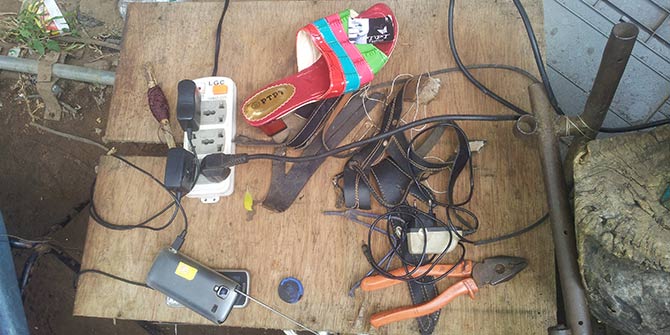LSE’s Catherine Boone highlights how a new research collaboration with the Kenya Land Commission will shine new light on a central pillar of the Kenya government’s efforts to address land injustice.
Smallholder settlement schemes have played a central role in the economic and political development strategies in postcolonial Kenya. In the transition to independence, settlement schemes help de-racialise land ownership in the former whites-only scheduled areas and offered land to many of those who had been displaced in the struggle against British colonial rule. These land transfers were lynchpins in the political coalitions and economic development strategies in Kenya’s first 25 years of statehood, and they figure prominently in virtually all political economy studies of Kenya in the 1960-1980 period.
Since the mid-1980s, however, scholarly attention in Kenya’s settlement schemes has declined. Scholarly and technical studies of settlement schemes in post-1985 Kenya are scarce and fragmented. Many outside observers believe that the era of smallholder settlement schemes in Kenya came to a close around 1982.

Image Credit: Catherine Boone
Yet the reality is quite the opposite! In fact, almost half of Kenya’s 483 settlement schemes were created after the 1980s. The creation of new smallholder settlement schemes and the ongoing institutional restructuring of the older ones has remained a central pillar of the Kenyan government’s efforts to address landless, ordinary citizens’ demands of land, and land injustices.
A project initiated by Catherine Boone, Professor of Comparative Politics at the LSE, and Dr Fibian Lukalo, Research Director of Kenya’s National Land Commission, is contributing to the very large task of updating scholarly and policy-makers’ knowledge of settlement schemes in Kenya. Their aim is to lay foundations for extracting policy lessons that will be relevant for not only 21st century Kenya, but also governments and planners in other developing countries that are relying on smallholder settlement schemes as a pillar of rural development and post-conflict peace building policies. The project asks: How have Kenyan government policies and practices around the creation and support of smallholder settlement schemes changed over time? How have early schemes fared over time? What variations in project design seem most important in determining scheme sustainability and success? What lessons for the future can be learned from an analysis of smallholder schemes across regions of Kenya and over time?
The team partnered with Professor Sandra Joireman of the University of Richmond to inventory and geocode over 1,600 settlement scheme maps collected and scanned by Kenya’s Ministry of Lands.
With funding from the UK Economic and Social Research Council (ESRC), the NLC, and the University of Richmond, a team of ten Kenyan and American interns are working at the NLC in Nairobi for four weeks in June 2018. Under the direction of Professor Kimberley Browne, Director of the Spatial Analysis Lab at the University of Richmond, they are creating an inventory, cataloging, georeferencing and digitising the 1,600 settlement scheme maps.
This project is an example of international scholarly collaboration for research and policy impact at its finest. Many commissioners from the NLC are seconded from Kenyan universities, as is Dr Lukalo. Their university training provides them with the vision for research that can benefit government and promote national development. An important outcome of this research project is the training opportunities for NLC staff who are working together with their LSE and University of Richmond counterparts to georeference and digitise the maps. The project will develop a complete georeferenced inventory of scheme locations and basic scheme attributes that will become part of the basic patrimony of the Kenyan people, to be used by policy makers, experts, citizens, and academic researchers in the pursuit of welfare-enhancing public and private innovation in the land and human development sectors. The technical skills, scholarly collaboration, and geographic data will remain with the Commission long after the international team goes home. It will also provide a database to fuel social science research on land use, economic development, spatial inequalities, climate change adaptation, and the political-economy of land allocation in Kenya.
Catherine Boone is Professor of Comparative Politics at LSE.
The views expressed in this post are those of the author and in no way reflect those of the Africa at LSE blog, the Firoz Lalji Centre for Africa or the London School of Economics and Political Science.






Hello,
in the context of the MSc Environmental Governance Program of Freiburg University (MEG), I am currently writing my MSc thesis on possibilities to increase small holder participation in organic contract farming in Kwale county, Kenya. I have just returned from a 10 weeks data collection in the field. Interestingly, small holder settlement schemes have quite an impact on participation in organic contract farming. Matuga, for instance, is quite sparsely populated and farm households tend to have large pieces of land, of which often only 30% are cultivated. Others have too little land available for additional crop production and therefore also disqualify for contract farming arrangements.
I found the low population density somewhat surprising as soil fertility in this region is extremely high. In light of this finding I wanted to do some research on the small holder settlement scheme to understand when and under what criteria land has been distributed and stumbled over your blog. It is unfortunate that many households have large areas of idle land, while others have too little to afford additional crop production under contract. Most families lack necessary capital to make use of the large pieces of land.
Could you maybe quickly brief me on the current small holder settlement scheme in Kwale County, its history and purpose?
This would be very helpful.
Many thanks in advance,
Celina Schelle
I found this fascinating; that these settlement schemes should have been so distorted by history, and yet are clearly such an interesting experiment. I look forward to follow-ups to this deeply interesting work.